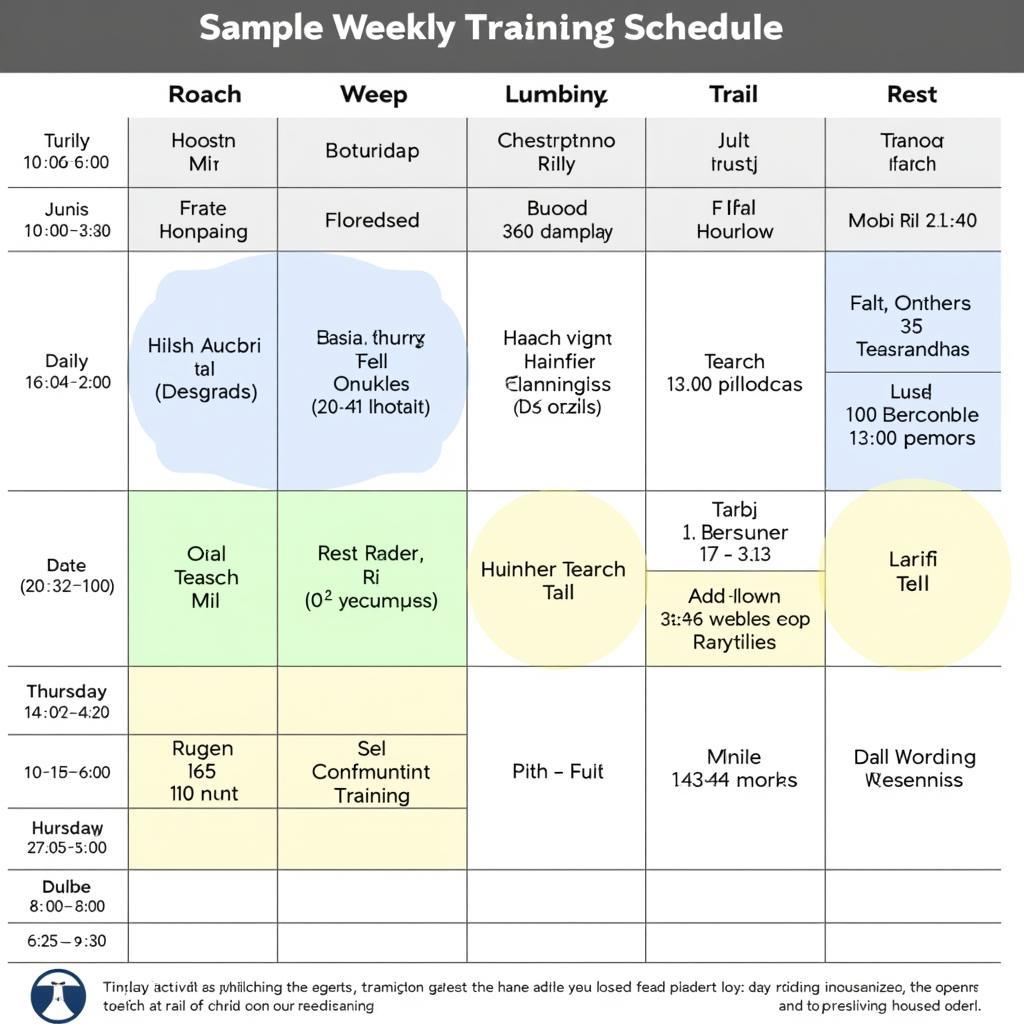Understanding the Iron Horse Schedule is crucial for anyone involved in equestrian activities, whether you’re a seasoned competitor, a casual rider, or simply a horse enthusiast. This guide will delve into the various aspects of creating and managing an effective schedule for your equine companion, covering everything from training and feeding to rest and recovery.  Example of an Iron Horse Training Schedule
Example of an Iron Horse Training Schedule
Creating an Effective Iron Horse Schedule
A well-structured iron horse schedule is the cornerstone of a healthy and happy horse. It provides consistency, predictability, and allows you to tailor activities to your horse’s individual needs and goals. This structured approach benefits not only the horse’s physical well-being but also their mental and emotional state. Just like with the iron horse saloon band schedule, consistency is key.
Factors to Consider When Planning Your Schedule
Developing the perfect iron horse schedule requires careful consideration of various factors, including the horse’s age, breed, discipline, current fitness level, and overall health. Young horses, for instance, require shorter, less intense training sessions compared to mature, seasoned athletes. Similarly, a horse preparing for a competition will have a more demanding schedule than one primarily used for leisure riding.
- Age and Breed: Consider the physical limitations and developmental stages of your horse.
- Discipline: Tailor the schedule to the specific demands of your chosen discipline (e.g., dressage, jumping, racing).
- Fitness Level: Gradually increase the intensity and duration of activities to avoid injuries and burnout.
- Health: Factor in any existing health conditions or previous injuries and adjust the schedule accordingly.
Incorporating Rest and Recovery
Rest and recovery are just as crucial as exercise in an iron horse schedule. Adequate rest allows the horse’s muscles to repair and rebuild, preventing injuries and promoting overall well-being. Incorporate rest days into the schedule, allowing for complete downtime or light activities like grazing or hand-walking.
Just like finding the right horse boarding snohomish, finding the right balance in a schedule is essential. Overtraining can lead to exhaustion and decreased performance.
Feeding Schedules for the Iron Horse
A well-planned feeding schedule complements the iron horse training schedule and ensures optimal nutrition for your equine partner. Horses are grazing animals and thrive on a consistent supply of forage. Divide their daily ration into multiple smaller meals throughout the day to support their digestive system and prevent colic.
What does the Iron Horse Northampton Schedule look like?
Understanding the different types of “iron horse schedules” can be confusing. For instance, you might be looking for information on the iron horse northampton schedule, which is likely related to an event or performance venue. While this article focuses on horse care, it’s important to clarify these distinctions.
Common Questions About Iron Horse Schedules
What are the signs of an overtrained horse? Signs can include lethargy, loss of appetite, resistance to work, and increased susceptibility to illness.
How often should I deworm my horse? Consult with your veterinarian to establish a suitable deworming protocol, potentially considering a product like panacur horse dewormer.
Can I adjust my horse’s schedule during different seasons? Yes, you can adapt the schedule to accommodate changes in weather and daylight hours.
“A well-structured schedule is a testament to your commitment to your horse’s well-being,” says Dr. Emily Carter, DVM, specializing in equine sports medicine. “It’s a proactive approach to maximizing their potential and ensuring a long and healthy life.”
 Adjusting the Horse Schedule Seasonally
Adjusting the Horse Schedule Seasonally
Conclusion
Creating and maintaining a consistent iron horse schedule is an essential part of responsible horse ownership. By carefully considering your horse’s individual needs, incorporating rest and recovery, and focusing on their overall well-being, you can create a schedule that fosters optimal health, performance, and a strong bond between you and your equine companion. Remember, finding quality horses, like those found through resources such as horses for sale nashville, requires a strong commitment to their well-being, which includes a proper iron horse schedule.
FAQ
- What is an iron horse schedule? An iron horse schedule refers to a structured plan for a horse’s daily activities, including training, feeding, rest, and other essential care.
- Why is a consistent schedule important for horses? Horses thrive on routine, and a consistent schedule helps regulate their digestive system, promotes better sleep, and reduces stress.
- How often should I adjust my horse’s schedule? Adjustments should be made based on the horse’s individual needs, training goals, and any changes in their health or environment.
- How do I incorporate rest and recovery into my horse’s schedule? Include designated rest days with light activities like grazing or hand-walking to allow for muscle repair and prevent burnout.
- What are the benefits of a well-planned feeding schedule? A consistent feeding schedule supports healthy digestion, prevents colic, and ensures optimal nutrition for the horse.
For further support, contact us at Phone Number: 0772127271, Email: [email protected] or visit our address: QGM2+WX2, Vị Trung, Vị Thuỷ, Hậu Giang, Việt Nam. Our customer care team is available 24/7.